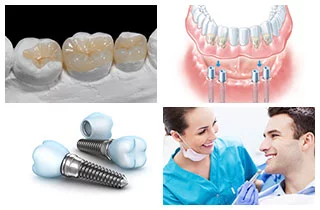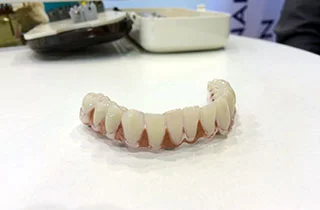Dental implants are great when a tooth is missing, stable, long-lasting and often the best solution for your smile. But let’s be honest: The costs can sometimes take your breath away. Depending on where you go, which clinic and which material, there are real differences everywhere. But don’t worry, there are ways to get good quality at a fair price. In some countries, you can get reliable implants without spending a fortune.
These articles will tell you in which countries you can get cheap dental implants, compare prices and give tips on what to look out for. The article is aimed at people who are considering dental implants but are looking for the best solution in terms of value for money and are open to treatment abroad (especially in Hungary) to receive high-quality care at a more affordable price. 
- What is the dental implant?
- In which country are dental implants cheapest?
- What are the alternatives to implants?
What is the dental implant?
A dental implant is a permanent artificial tooth root made of titanium or zirconia that is surgically placed into the jawbone and supports a replacement tooth, bridge, or denture. It functions like a natural tooth and prevents bone loss in the jaw.
A dental implant typically consists of three parts:
Implant Post: A screw-like structure that is inserted into the jawbone. Abutment: A connector that is attached to the implant post. Crown: The visible artificial tooth that sits on top.
Dental implants have really changed things – they are no longer just a replacement for missing teeth. They feel like your own, look natural, and give you stability that conventional dentures or bridges simply cannot provide. You could almost say: They bring your smile back – and for the long term. Thanks to modern technologies, fair prices, and international treatment options, high-quality implants are now accessible to many people. It has never been so easy to bite properly again and feel completely comfortable. Become curious? Take a look at the different types of dental implants – there are more options than you might think at first glance.
What Actually Determines the Price of a Dental Implant?
The price for dental implants depends on several factors. Right at the top: the country and location of the treatment. Between countries – and even within a region – costs can vary significantly. Why? Labor costs, legal regulations, material prices, or simply market demand make the difference.
Implant Material: Titanium implants are standard, zirconia (ceramic) implants, however, are sometimes more expensive due to aesthetics and biocompatibility.
Implant Brand: Well-known brands (Straumann, Nobel Biocare, etc.) can be more expensive than less known alternatives.
Additional Procedures: Bone Grafting, Sinus Lift or extractions increase the overall costs.
Type of Prosthesis: A single implant with a crown is cheaper than a full mouth restoration (All-On-4, Dentures
or Dental Bridges).
Clinic Facilities and Technology: Dental clinics with large equipment can charge higher prices.
Insurance and Payment Plans: Some (private) insurance plans cover part of the costs, others do not.
In which country are dental implants cheapest?
When you think about dental implants, bridges, or crowns, you often face a whole range of decisions. In Hungarian dental clinics, for example, you have the choice between standard solutions and high-quality brand implants. Both can be a good option, it really depends on what is important to you: durability, comfort, appearance… or maybe everything together?
Hungary has long been no longer an insider tip when it comes to dental treatments. The prices are usually significantly lower than in Western Europe, often even by half. Nevertheless, you shouldn’t just choose the cheapest offer. Because, let’s be honest: quality has its price here too. It’s better to look closely; Who is treating you? Which materials are being used? And how satisfied were other patients with their treatment? In the table below you will find a rough guide to the prices.
By the way: In Hungary, the stated costs usually already include everything – material, laboratory, dentist’s fee. So no unpleasant surprises. Of course, standards differ from country to country – training, regulations, insurance. But Hungary scores here with a really good price-performance ratio. Many clinics are equipped with state-of-the-art technology and work at an international level. Still: trust is important. Take your time to read reviews and form your own opinion. After all, it’s about your smile – and it deserves the best possible treatment.
| Which country is the cheapest? | Western Europe* | Poland* | India* | Hungary** |
|---|---|---|---|---|
| Unimplant | Ireland* –1 480 € | Poland –850 € | India –450 € | Hungary** –650 € |
| Alpha Bio dental implant | Ireland* –2 100 € | Poland –940 € | India –500 € | Hungary** –715 € |
| SGS dental implant | Ireland* –2 380 € | Poland –940 € | India –500 € | Hungary** –715 € |
| Straumann dental implant | Ireland* –2 400 € | Poland –1 220 € | India –650 € | Hungary** –930 € |
| Nobel dental implant | Ireland* –2 580 € | Poland –1 240 € | India –660 € | Hungary** –950 € |
| Sinuslift | Ireland* –940 € | Poland –650 € | India –350 € | Hungary** –500 € |
| Long-term temporary denture (12 pieces) | Ireland* –2 064 € | Poland –940 € | India –500 € | Hungary** –720 € |
| Metal-ceramic crown | Ireland* –658 € | Poland –460 € | India –240 € | Hungary** –350 € |
| Zirconia crown | Ireland* –946 € | Poland –590 € | India –310 € | Hungary** –450 € |
| I want to get a quote from Hungary*Source: 2024 National Dental Advisory Service, Comprehensive Fee Report **Source: Average prices of the 3 clinics of BestDentalSolutions The prices are indicative, the treatment plan and quote is always prepared in Euro. Regardless, the payment of the treatments is in another currency possible (current daily Eur exchange rate). |
||||
What are the alternatives to implants?
If dental implants are too expensive or not suitable for you for health reasons, there are various alternatives for replacing missing teeth:

Dental Bridges
A fixed prosthesis that can be attached to adjacent healthy teeth to replace a missing tooth.
Advantages: Cheaper than implants, no surgical procedure required.
Disadvantages: Requires grinding down adjacent teeth for support, may not be as durable as implants.
Partial or Full Dentures
Removable dentures that can replace multiple missing teeth or entire arches.
Advantages: Cost-effective, non-invasive, quick solution.
Disadvantages: Can be uncomfortable, may slip while eating or speaking, requires regular care.
Resin-Bonded Bridge (Maryland Bridge)
A bridge that is attached to the back of adjacent teeth using a metal or porcelain framework.
Advantages: Less invasive than conventional bridges, no grinding of adjacent teeth required.
Disadvantages: Not as stable as conventional bridges, may not be well suited for molars.
Removable Partial Dentures (RPD)
A metal or acrylic framework with replacement teeth that can be attached to existing teeth.
Advantages: Low cost, easy to adjust.
Disadvantages: Less stable than fixed options, can cause discomfort.
Overdentures
A denture that can be attached to some remaining teeth or implants for better stability.
Advantages: More secure than conventional dentures, cheaper than full implants.
Disadvantages: Requires a certain amount of bone or teeth for support.


